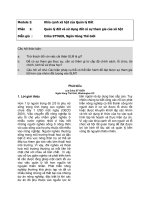LUẬN MẪU LỚP 12 The importance of good roads in a country
Bạn đang xem bản rút gọn của tài liệu. Xem và tải ngay bản đầy đủ của tài liệu tại đây (78.24 KB, 10 trang )
The importance of good roads in a country
Good roads are essential for the development of a country. The
Romans realised this centuries ago, and wherever they
established themselves, , they tried to improve the roads there.
Today, the governments of all countries in the world are
building more and more roads to gain access to the remotest
regions of their countries.
Roads link towns and villages and enable the people of one
place to communicate with the people of another place. When
food is scarce in one place, it can be brought from another place
without much difficulty. Even things which cannot be produced
in one region can be brought from another region where they are
produced in abundance. The invention of motor-vehicles has
made it easy to transport goods from place to place. But these
vehicles require good roads to travel quickly, and the better the
roads the more goods can be transported from one place to
another in a very short time. Thus, trade is improved.
Further, good roads help people to travel easily to places where
they can work and develop their lands and industries. In
Malaysia, for example, the improvement of roads has made it
easy for skilled workers from the towns to work in remote
villages. The people of the villages, on the other hand, have
been able to learn much from the towns. As a result, there has
been a lot of improvement in this country in all spheres of
activity.
Finally, in times of war good roads help armies to move about
without difficulty. Sometimes, a country is defeated because its
army is not able to reach a place in good time owing to bad
roads. Even the police may not be able to reach a place where
there is some trouble if the roads are bad. For all these reasons:
it is always necessary for a country to have good roads.
New words:
1. establish (v): thành lập, thiết lập, kiến lập
2. scarce (adj): khan hiếm
3. abundance (n): nhiều, dư dật, giàu có, phong phú
4. sphere (n): lĩnh vực, phạm vi, tầm ảnh hưởng
5. defeat (v): đánh bại, làm thất bại
Life in the village
The village has always been known to be a place of peace and
quiet. The scattered houses among hundreds of plants and trees
at once indicate the lack of activity in the village.
The workers in the village leave their homes early in the
morning to work in the plantations or towns nearby. Some have
their own plantations, and some make certain articles in their
homes to sell them in the towns. A few of the villagers,
including women, go out to catch fish in the streams and rivers
found in the village. Though the people of the village do not
usually earn much, yet they seem to be contented.
In the afternoon, most of the villagers are at home. Some of
them take a nap after lunch; some work in their small gardens,
and some visit the small shops in the village. In various parts of
the village children may be seen playing the popular games of
the village. Occasionally, a cyclist passes by.
Then, in the evening, the villagers meet one another. Some play
cards and other types of games peculiar to the village. Some talk
about the day's incidents in the village, and those whose minds
go beyond the village discuss world events.
In almost every village there is a headman whose duty is to
settle quarrels among the villagers and maintain peace in the
village. Whenever there is a dispute, the villagers go to the
headman who is held in such esteem that his word has the force
or law. In this way the villagers have developed their own
simple laws, and the crimes of cities are almost unknown to the
people of the village.
During a festival, the whole village is alive with activities.
Everyone is in a happy mood and plays his part to make the
festival a success. This is the time for the men, women and
children of the village to wear their best clothes and the village
is full of colour. These simple ways of life in the village,
however, must soon change. Progress in science and education
has already begun to affect the outlook of the people in the
village, and hundreds are leaving the village to seek their
fortunes in the towns and cities.
New words:
1. scattered (adj): lác đác, lưa thưa, rải rác
2. article (n): hàng, vật phẩm, đồ đạc
3. contented (adj): thoả mãn, mãn nguyện
4. nap (n): giấc ngủ trưa
take a nap after lunch: ngủ một giấc sau bữa ăn trưa
5. cyclist (n): người đi xe đạp
5. headman (n): trưởng làng, già làng, tù trưởng
7. dispute (n): cuộc bàn cãi, cuộc tranh luận
8. esteem (n): sự kính mến, sự quý trọng
9. mood (adj): tâm trạng, tính khí, tâm tính
10. fortune (n): vận may
My favourite author
My favourite author is William Shakespeare, a man who has
written enough for immortality.
Though a few hundred years have elapsed since the death of
Shakespeare and volumes have been written on the life and
work of this great writer, his early life still remains a subject for
speculation and conjecture. It is generally believed that
Shakespeare had very little schooling. Yet his keen intellect and
mastery of language have earned for him the appreciation and
applause of the literary world.
Shakespeare's fame, 'I think, originates from his ability to
identify his readers with the characters in his stories. In most of
his stories we find reflections of our own experiences. This
shows strikingly that Shakespeare had an insight into 'human
nature and the problems of life. His tragedies such as "Macbeth'
and "Hamlet” clearly show his deep knowledge of the human
mind. Man's ambition, desperation, sorrows, frustrations and
hopes are dealt with in these tragedies with such skill that the
reader himself experiences all the mental conflicts and
emotions, and thus gets a better idea about human nature. With
equal skill, Shakespeare deals with man's joys and pleasures in
all his comedies. His comedies like, "Twelfth Night" and "As
You Like It,' are a delight to read. Through the characters in his
stories Shakespeare conveys his views on life and the world.
Most of his characters, such as Hamlet, are vehicles for moral
instruction. Man's nature is the theme of all his writings. By a
skillful combination of words and situations, he reveals the
worst as well as the best in man. His choice of words is masterly
and many of his phrases are literary gems. As man's nature is his
theme, what he wrote years ago remains true even today, and it
will remain so till the end of time. It is for all these reasons that I
enjoy reading Shakespeare.
However, I do enjoy reading the works of other writers too, such
as those of Charles Dickens and Jane Austen. But they do not
give the satisfaction that Shakespeare gives. I find Shakespeare's
stories so interesting that I have read the same stories several
times in last few years; and, every time I read the same story, I
learn something new about human nature. Shakespeare was
indeed a genius.
New words:
1 favourite (adj): được mến chuộng nhất được ưa thích nhất
2. immortality (n): bất tử bất diệt, bất hủ, danh tiếng muôn thuở
3. elapse (v): (nói về thời gian) trôi qua
4. speculation (n): sự nghiên cứu, sự suy xét
5. conjecture (n): sự phỏng đoán
6. applause (n): sự hoan nghênh, sự tán thưởng
7. ambition (n): hoài bão, tham vọng
8. frustration (n): sự làm thất bại, tâm trạng vỡ mộng
9. conflict (n): sự xung đột, cuộc xung đột
10. theme (n): đề tài, chủ đề
11. combination (n): sự kết hợp, sự phôí hợp
12. reveal (v): bộc lộ, biểu lộ, khám phá
13. masterly (adj): rất giỏi, bậc thầy, tài tình
14. gem (n): đá quý, viên ngọc
15. genius (n): người thiên tài, người anh tài, bậc kỳ tài
A frightening experience
I am not one who is frightened easily; but I must admit that one
night I saw a figure that struck terror into my heart.
It was a moonlit-night. I was returning home on foot from a
town a few miles away. That was the first night in my life that I
was out alone. The road along which I was walking was not
used much at night. Even during the day, it was used only by
those who worked in the rubber and banana plantations long that
road. As I was walking, I could hear the noises made by
squirrels, insects and owls. Creatures that love the night world
such as bats were very active, and there were hundreds of
shadows. All these did not, however, frighten me. I held a stick
in my hand and moved rapidly towards home for my dinner.
Then, suddenly, I caught sight of an old lady, a short distance
away. Her head was covered with a white cloth, and she was
waving to me.
Curious to know why she was there at that time of the night, I
stopped for a while. As I stood there, however, vague memories
of stories about ghosts began to come back to my mind. I was
soon gripped with fear and took to my heels. I ran as fast as I
could, and when I reached home I could hardly speak.
On the next day, however, I visited that place again to make sure
that the woman was indeed a real person and not a ghost. But I
could find no footprints there. Only a banana plant stood there
with its leaves moving in the breeze. I realised then that it was
the banana plant with its leaves moving in the breeze that looked
like a woman waving her hand. I had indeed made a tool of
myself; but after the previous night's experience, this discovery
was small relief to me.
New words:
1. frighten (v): làm hoảng sợ, làm sợ
2. moon-lit night: đêm sáng trăng
3. vague (adj): mơ hồ, lờ mờ, mập mờ
4. breeze (n): gió nhẹ
5. previous (adj): trước
The value of higher education
Since the dawn of civilization, great thinkers like Plato and
Aristotle have been doing their utmost to spread education to the
remotest corners of the earth. It is realised that education
develops the intellect and enables one to discriminate between
the good and the bad. More and more universities and other
education institutions are therefore being opened in all parts of
the world to provide higher education.
In almost every country today, there is a lot of unemployment.
Only those who have received a high standard of education are
able to secure high positions in society and in the various
professions. It has therefore become necessary for many people
to attend institutions or higher learning to improve their
prospects of employment.
Higher education confers many other benefits. It broadens the
mind and increases one's powers of thinking, reasoning and
imagination. Further, it makes one more sympathetic towards
others. It helps us to understand the problems and weaknesses of
man, and we become less suspicious of strangers and others. We
also become more thoughtful of the feelings and needs of others.
As a result, we are able to mix better with people. Besides,
higher education helps us greatly in deciding what is right and
what is wrong, what is true and what is false. Therefore, people
can hardly deceive or mislead us. Higher education also teaches
us how to spend our leisure moments. We learn to make the best
use of our spare time. Even during old age we know how to
keep ourselves occupied. Again, higher education develops self-
confidence. We learn to have faith in our own abilities. As a
result, we are able to meet and talk with people anywhere. All
these qualities, acquired through higher education, combine to
make one a leader among men. One is able to live a better life in
society.
The benefits of education are therefore many, and everyone
should try his best to acquire the highest of education, either by
attendance at an educational institution or by private studies.
New words:
1 civilization (n): nền văn minh
2. discriminate (v): phân biệt
3. institution (n): cơ quan, tổ chức
4. suspicious (adj): nghi ngờ, tỏ ra có sự nghi ngờ
5. mislead (v): làm cho mê muội, làm cho lạc đường, lạc lối
6. self-confidence (n): sự tự tin, lòng tự tin
7. combine (v): phối hợp, kết hợp









